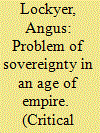| Srl | Item |
| 1 |
ID:
139375


|
|
|
|
|
| Summary/Abstract |
This essay presents the major factors that make up the framework in which Greek foreign policy operates and explores whether they have any connections to past centuries, especially to Antiquity. They include Greece’s consequential geographical location between East and West and the fact that the country has often found itself at the center of international developments and debates. It is argued that Greece’s relative weakness demands strong alliances, elicits compensatory actions, and often allows individual politicians to play an outsized role in diplomatic affairs. Finally, the salience of nationalism, the current return to a more active participation in the eastern Mediterranean, and the extraordinary resilience of the Hellenes complete an explanatory framework for Greek diplomacy with specific historic antecedents.
|
|
|
|
|
|
|
|
|
|
|
|
|
|
|
|
| 2 |
ID:
125222


|
|
|
|
|
| Publication |
2013.
|
| Summary/Abstract |
ABSTRACT: This article examines a confrontation at the Exposition Universelle in Paris in 1867 between the Tokugawa shogunate and the domain of Satsuma. The confrontation was provoked by the latter, which used its control over the Ryukyu Islands, the services of a minor Franco-Belgian nobleman, and the opportunity of the international exhibition to demonstrate its independence from and equality to the shogunate. The episode was incidental to the collapse of the Tokugawa state later that year, but is a useful microcosm through which to understand the relationship between domestic considerations and international relations in the constitution of the modern state. Most accounts of modern Japan tend to be premised on the normative status of the latter, both as a natural container within which the early modern elements of the archipelago could be alchemized and as a soon-to-be sovereign actor on the international stage. This article argues, however, that this assumption is problematic. By the 1860s the order was clearly inadequate to the demands of the international system. The Meiji state, however, remained vulnerable to these, in ways the events in Paris suggest. The shogunate's difficulties underline the effort necessary to create the appearance of sovereignty, but also the extent to which its assertion and recognition is subject less to professed norms of equality and independence than the consequences of interest, industry, and empire. As such, it becomes clear that sovereignty can disrupt as much as it can clarify, undermining the order it seems to promise.
|
|
|
|
|
|
|
|
|
|
|
|
|
|
|
|